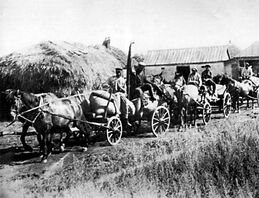 Ukraine on 26 November marked the 90th anniversary of the Holodomor – the famine of 1932-33 in which millions of Ukrainians died. Since 2006, the country has recognised the Holodomor as a deliberate act of genocide against the Ukrainian people, perpetrated by the Soviet authorities under Joseph Stalin. The anniversary falls as Russia is once again using food as a weapon of war, both against the Ukrainian people and the rest of the world, and with Ukrainians again facing what may be perceived as genocide at the hands of a Russian regime that denies Ukraine’s right to statehood. “Ninety years after the Holodomor genocide committed on the territory of Ukraine, Russia is committing a new genocide – war. The eternal enemy is again trying to “denationalise” and suppress us so as not to let us out of its influence and prevent the strengthening of Ukrainian statehood. The methods of the latest Putin regime differ little from Stalin’s: murder, terror with hunger and cold, intimidation, and deportation,” Kyiv’s Holodomor museum said on 16 November. The term Holodomor derives from the Ukrainian words for hunger (holod) and extermination (mor). Between 3.5 million and 7 million people are estimated to have died in Ukraine’s grain producing regions during the Holodomor. The famine peaked in the summer of 1933, when the daily death toll from starvation is estimated at around 28,000. During this period, the Soviet Union exported 4.3 million tonnes of grain from Ukraine to earn hard currency to pay for its industrialisation drive. The famine came about as a result of Stalin’s policy to collectivise agriculture, forcing those who lived and worked on the land to give up their farm holdings and personal possessions to join the new collective farms. Collectivisation faced mass opposition in many parts of the Soviet Union, including Ukraine, and led to lower production and food shortages. In November 1932, Stalin dispatched agents to seize grain and livestock from newly collectivised Ukrainian farms, including the seed grain needed to plant crops the following year. While other grain-producing regions of the Soviet Union also suffered mass hunger as a result of collectivisation, the policies enacted in Ukraine were far more brutal than elsewhere, with whole villages and towns blacklisted and prevented from receiving food, as Stalin sought to stifle rebellions and armed uprisings by Ukrainian resistance movements. Yale University historian Timothy Snyder has referred to the mass starvation that followed as “clearly premeditated mass murder”. The harsh reprisals against Ukrainians included a campaign of repression and persecution against Ukrainian culture, religious leaders and anyone accused of Ukrainian nationalism. The Soviet authorities denied the existence of famine, prevented travel to the regions affected and suppressed reports of it, refusing offers of assistance from the Red Cross and other humanitarian organisations once news of the tragedy leaked out. The parallels between Stalin’s repression of Ukraine in the early 1930s and Russian president Vladimir Putin’s actions 90 years later are stark. Russia’s targeting of grain storage facilities and its blockade of Ukraine’s Black Sea exports have sparked accusations that Moscow is using food as a weapon of war. And repeated waves of attacks on Ukraine’s energy infrastructure are cutting off electricity and water supplies with the aim of breaking the resolve of the Ukrainian people, just as the withdrawal of food supplies did during the Holodomor. "On the 90th anniversary of the 1932-1933 Holodomor in Ukraine, Russia's genocidal war of aggression pursues the same goal as during the 1932-1933 genocide: the elimination of the Ukrainian nation and its statehood," Ukraine's foreign ministry said in a statement. And Ukrainian president Volodymyr Zelensky said in a video posted on social media, “Once they wanted to destroy us with hunger, now – with darkness and cold…. We cannot be broken.” Several European leaders – including from Belgium, Lithuania and Poland – travelled to Ukraine for the anniversary to pledge their support for the country. Other nations, including Germany and Ireland – which suffered its own devastating famine in the 19th century – are joining Ukraine in recognising the Holodomor as a genocide on the Ukrainian people. And Michael Carpenter, the US ambassador to the Organisation for Security and Cooperation in Europe, addressed its permanent council in Vienna with a damning statement: “The men, women, and children who lost their lives during this famine were the victims of the brutal policies and deliberate acts of the regime of Joseph Stalin. This month, as we commemorate those whose lives were taken, let us also recommit ourselves to the constant work of preventing such tragedies in the future and lifting up those suffering under the yoke of tyranny today. “It is especially important this year to remember that the word “Holodomor” means “death by hunger.” Putin’s regime is demonstrating its brutality in Ukraine by conducting attacks across Ukraine’s agriculture sector and by seizing Ukraine’s grain, effectively using food as a weapon of war.” Ukrainians typically mark the anniversary, which falls on the fourth Saturday of November, by placing candles in their windows. Today they need those candles to light their homes.
0 Comments
Leave a Reply. |
Keeping stories aliveThis blog aims to discuss historical events relating to the Jewish communities of Ukraine, and of Eastern Europe more widely. As a storyteller, I hope to keep alive stories of the past and remember those who told or experienced them. Like so many others, I am deeply troubled by the war in Ukraine and for the foreseeable future, most articles published here will focus on the war, with an emphasis on parallels with other tumultuous periods in Ukraine's tragic history. Archives
March 2024
Categories
All
|
 RSS Feed
RSS Feed
